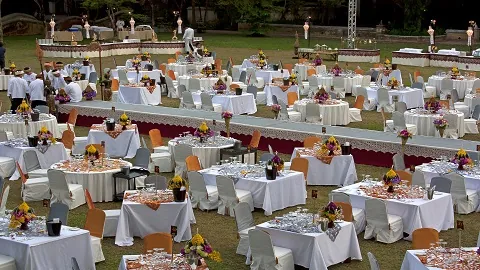Event Manager
An event manager is a multi-skilled professional who excels in the art of planning and executing a wide range of events, from corporate conferences and trade shows to weddings and festivals.
They meticulously plan, coordinate, and oversee all aspects of an event, ensuring seamless execution and memorable experiences for attendees. With a keen eye for detail, creativity, and strong organisational prowess, an event manager brings visions to life and transforms concepts into captivating and successful occasions.
- Introduction
- Typical Job Responsibilities
- Standard Work Environment
- Suggested Work Experience
- Recommended Qualifications
- Projected Career Map
- Beneficial Professional Development
- Learn More
- Conclusion
An event manager's responsibilities encompass event conceptualisation, planning, and execution. They liaise with clients to understand objectives, propose creative ideas, and establish budgets. Coordinating with vendors, they secure venues, catering, decor, and technical arrangements. Logistics, scheduling, and staff coordination fall within their purview. Adhering to timelines, they manage event setup, registration, and troubleshooting. Post-event, they evaluate success, gather feedback, and refine future strategies. Adaptability, problem-solving, and a passion for crafting exceptional experiences are crucial traits for an event manager.
Event Manager
An event manager is a multi-skilled professional who excels in the art of planning and executing a wide range of events, from corporate conferences and trade shows to weddings and festivals.
They meticulously plan, coordinate, and oversee all aspects of an event, ensuring seamless execution and memorable experiences for attendees. With a keen eye for detail, creativity, and strong organisational prowess, an event manager brings visions to life and transforms concepts into captivating and successful occasions.
An event manager's responsibilities encompass event conceptualisation, planning, and execution. They liaise with clients to understand objectives, propose creative ideas, and establish budgets. Coordinating with vendors, they secure venues, catering, decor, and technical arrangements. Logistics, scheduling, and staff coordination fall within their purview. Adhering to timelines, they manage event setup, registration, and troubleshooting. Post-event, they evaluate success, gather feedback, and refine future strategies. Adaptability, problem-solving, and a passion for crafting exceptional experiences are crucial traits for an event manager.
Event managers thrive in dynamic settings, splitting time between office planning and on-site execution. They collaborate with clients and vendors in office spaces, using technology to draft plans, budgets, and proposals. On event days, they immerse themselves in bustling venues, overseeing setup, coordinating teams, and addressing unforeseen challenges. This role demands a flexible, fast-paced environment, blending creativity and precision to deliver memorable events.
Ideal event manager candidates typically possess prior experience in event planning, coordination, or related roles. A background in hospitality, marketing, or communications provides a solid foundation. Previous work involving client interaction, budget management, and vendor coordination is advantageous. Candidates may have organised corporate functions, weddings, or community events, showcasing their ability to handle diverse event types. This cumulative experience equips them to excel in overseeing and executing successful events with finesse.
While a bachelor's degree in event management, hospitality, marketing, or a related field can be helpful, it's not essential. Any endorsed certificate or diploma in a related field is a good starting point. Strong communication, organisation, and problem-solving skills are essential. Experience in event planning, vendor coordination, and client interaction further solidifies qualifications, ensuring the capability to deliver seamless and impactful events.
event managers typically begin as Assistants or Coordinators, learning the ropes of event planning, logistics, and client relations. Progressing to Senior event manager roles, they lead larger events, manage teams, and refine strategic decision-making. With experience, they can advance to Director or Head of Events positions, overseeing entire event departments and shaping organisational event strategies. Continued professional development and networking open doors to broader industry opportunities and specialisation paths.
event managers can enhance their expertise through various avenues. Pursuing advanced certifications or specialised courses in event technology and marketing adds value. Attending industry conferences, workshops, and joining professional associations provide networking opportunities and insights into emerging trends. Developing leadership and management skills equips them to lead teams effectively. Exploring digital marketing and sustainability practices further enhances their ability to create impactful and environmentally conscious events.
Embarking on a career as an Event Manager is an exciting journey that involves orchestrating memorable events, managing logistics, and ensuring a seamless experience for clients and attendees. Here's a succinct overview:
- Event Planning and Execution: Event Managers excel in event planning and execution, overseeing every detail from concept to implementation to create unforgettable and smoothly-run occasions.
- Logistics Management: Proficient in logistics management, Event Managers coordinate venue selection, transportation, and other essential elements to ensure the efficient and effective execution of events.
- Client Collaboration: Effective client collaboration is crucial, as Event Managers work closely with clients to understand their vision, preferences, and objectives, tailoring events to meet and exceed expectations.
- Vendor Coordination: Managing vendor relationships, Event Managers collaborate with suppliers, contractors, and service providers to secure the necessary resources for events, ensuring quality and reliability.
- Budgeting and Cost Control: Demonstrating financial acumen, Event Managers handle budgeting and cost control, optimizing resources to deliver exceptional events within specified financial parameters.
- Team Leadership: Effective team leadership is paramount, as Event Managers coordinate diverse teams of event staff, ensuring everyone is aligned and contributing to the success of the event.
- Communication Skills: Clear and effective communication is key, as Event Managers liaise with clients, vendors, and event staff, conveying expectations and ensuring everyone is well-informed and coordinated.
- Problem-Solving: Demonstrating effective problem-solving, Event Managers address challenges promptly, ensuring events run smoothly and adapting plans as needed to ensure a successful outcome.
- Creativity: Injecting creativity into event concepts and design, Event Managers contribute to the uniqueness and appeal of each event, creating memorable experiences for attendees.
- Adaptability: Adapting to changing circumstances and unforeseen challenges, Event Managers stay versatile and composed to ensure events proceed seamlessly.
- Personal Traits for Event Manager: Creativity, adaptability, professionalism, attention to detail, effective communication, time management, customer focus, leadership, resilience, and a passion for creating memorable experiences collectively define a successful career as an Event Manager.
In a world where moments become memories, event managers craft the extraordinary. With precision and creativity, they shape experiences that linger in hearts and minds. From meticulous planning to flawless execution, their expertise ensures every detail resonates. If you have a passion for orchestrating remarkable experiences, this profession offers a fulfilling and exciting career path. Whether you're just starting out or looking for a change, becoming an event manager can be your gateway to creating unforgettable moments and leaving your mark on the clients you work with.


















